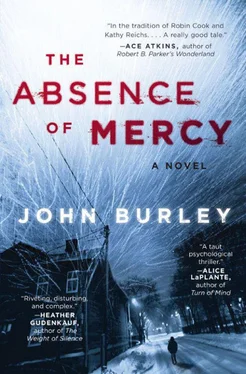Carl shook his head. “Nothing worth pursuing further,” he said. “Four individuals with driver’s license images demonstrating the left upper canine–premolar diastasis we were looking for. One of the four people is dead. Another one is seventy-four years of age and has advanced lung disease. He can’t walk from one room of his house to the next without gasping for air and having to rest for fifteen minutes on home oxygen. The other two individuals both have solid alibis during the time of at least one of the two attacks.”
“So it’s a dead end.”
“Pretty much, Chief.”
Sam leaned forward in his office chair, which emitted a soft creak of protest but held fast. The leather swivel chair had been brought into the office shortly after he was elected chief of police in 2001 and had served the large man faithfully during his entire tenure. Carl wondered how much life the legs of that chair still had in them, and he couldn’t help but imagine the explosive result of their eventual failure.
“The shoe prints from the second crime scene,” Sam said. “Any further progress on tracking those down?”
“Size eleven men’s Nikes. They’re from a model that came out a few years back. I checked the…”
“How many years back?” Sam interrupted him. He was a patient man, but he didn’t like ambiguity when it came to the evidence. If one could pin something down more exactly, it ought to be done. Sometimes it made a difference.
“Two,” Carl answered, unflustered. He was used to working with Sam Garston, and had spent many sessions with the chief in this very office during prior cases, the two of them rehashing the evidence incessantly until the pieces eventually began to fit together—sometimes, it seemed, by sheer will alone.
“What model?” Sam asked.
Carl picked up his notepad and flipped back several pages. “Nike Trainer. Manufactured from November 2011 through July 2012. Sold widely across the U.S. in numerous retail stores, as well as online. Pretty popular. It’s a cross-training shoe.”
“Records from local retailers?”
“Six retailers in the area carried the shoe. Two have since gone out of business and there are no records available. Three of the remaining four stores were able to come up with sales records regarding that size and model during the nine months they were sold. Roughly”—he flipped his notepad forward two pages—“sixty pairs were sold during that time. About one-third of the purchases were in cash.” He looked up from the notebook. “That leaves a lot of cracks to fall through, Chief.”
“Uh-huh.” Sam shifted in his chair and there was another protracted, disquieting creak from the supporting structure as he did so. He smiled at his colleague. “How are you getting along with the feds?” he asked.
Carl shrugged his shoulders. “I’ve been trying to play nice.”
“I appreciate that. And Detective Hunt? How’s he holding up?”
“Danny? I don’t know… still learning the job, I guess.” Carl returned his notebook to the pocket from whence it had come. “I think he’ll be fine, boss,” he remarked, “just as soon as he graduates from high school.”
“Just wait till he’s old enough to drink,” Sam warned him.
“Tell me about it. These new guys on the force… you know: lookin’ younger every year.”
Sam nodded in agreement. He looked thoughtful for a moment, his eyes focusing on a spot in the corner of the room he could see just over Carl’s left shoulder. Lookin’ younger every year . Sure. That was bound to happen as one’s own years went by with ever-increasing velocity—an occupational hazard of growing old. But was that all, Sam wondered, or was there something else there? He felt a slight tug in his chest, the pull of an idea that had taken shape while he wasn’t paying attention and was now trying to punch its way through to his conscious mind.
“—okay, Chief?”
“What?”
“You okay?”
Reluctantly, he returned to the moment at hand. Detective Schroeder was watching him questioningly.
“Think I lost you there for a moment, Chief.”
“Sorry.”
“Anyway,” Carl said, “I’d like to stay and chat, but I have to meet with Special Agent Culver from the FBI now, who wants to go over the phone records of every resident in eastern Ohio over the past ten years, or some other equally useless but time-consuming project.”
“Whatever it takes,” Sam replied, and there was something hard in his eyes, like a boy who has been beaten one time too many, and suddenly decides to come up swinging. “Let’s get this guy, Carl. I don’t want any more mutilated bodies turning up in this town.”
“Neither do I,” the detective agreed as he rose to go. “Neither do I.”
“How’s it goin’?” he asked, taking a seat at the table across from her. He’d poured two cans of tomato soup into a sauce pan that was heating on the range.
“Okay, I guess. I’m sore today.”
“Where?”
“My arms, mostly. They’ve got me doing these exercises with dumbbells now.”
Thomas gave her an appraising look. “You’re a lot stronger than you were when you first came home from the hospital. The physical therapy must really be helping.” He got up and went to the stove, turned off the burner, and ladled most of the soup into two bowls. “The muscles of your arms and legs are getting ripped.” He placed the bowls on the table, filled two glasses with water, grabbed a set of spoons from the drawer, and returned to his seat. “ Bon appétit, ” he said.
“Thanks,” she said with a smile. She basked in his compliment, knowing that what he had just said was true. She was much stronger now than when she’d first returned home from the hospital, and her arms and legs had become toned and chiseled from her endless succession of mandatory workouts. Except for the pink ridge of scar tissue that ran the length of her abdomen, her stomach was otherwise tight and flat above the subtle outline of her upper pelvis. From a physical standpoint, in fact, she was tougher and more resilient than she’d ever been.
They ate in silence for a while. It was a Saturday in late October. The weather had begun to turn cold, and it was a small pleasure to feel the warmth of the meal settling into her stomach one spoonful at a time. Her parents were attending a retirement party for one of her dad’s colleagues, and they’d left the two of them to fend for themselves for the afternoon. She looked over at Thomas, who had become a semiregular presence in their household, stopping over most days after school—sometimes with a few of Monica’s other friends, but quite often on his own. They would spend those afternoons sitting together in the living room watching television, discussing social happenings among their peers, or heading outdoors for walks and other outings when the weather was nice. It was good for her, she thought. She was being homeschooled for the year, and although this made it easier to coordinate her daily physical therapy sessions and regular medical checkups, she missed interacting with her friends. She found herself looking forward to Thomas’s visits and was disappointed on days when he couldn’t make it. Still, she sometimes wondered how it could be that one of the most popular guys in school had taken an interest in her—a shy, brainy type who would now struggle with a physical disability for the rest of her life.
“So, what are you doing for Halloween?” he asked, tipping his bowl slightly to scoop up the last bit of soup with his spoon.
She shrugged. “I don’t know.” She hadn’t really thought about it much beyond what she wouldn’t be doing. Trick-or-treating through the neighborhoods in the dark, going to a horror movie or a haunted house—all of those things were definitely out of the question.
Читать дальше
Конец ознакомительного отрывка
Купить книгу












